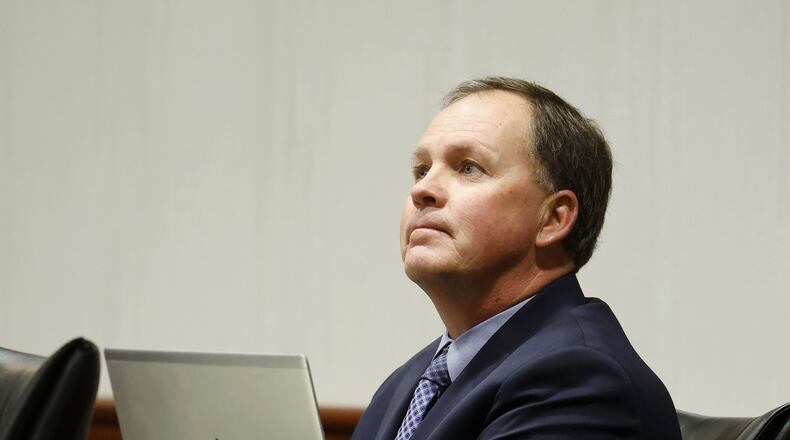Credit: Nick Graham
Credit: Nick Graham
Brad Tammaro, special prosecutor from the Ohio Attorney General’s Office, told the jury during opening statements that in 2015 Reynolds spearheaded a plan for a developer to expand a housing development, Liberty Grand Village, and said land owned by Gerald Parks, his father’s neighbor, would be a good fit.
Reynolds approached Parks, whose wife was dying of cancer and offered to purchase the land on a option contract with $9,000 paid up front, and the option to pay the whole price of $475,000 in two years.
Parks declined and Reynolds became “aggressive,” Tammaro said. Parks has also filed a civil suit against Reynolds involving the land deal.
“The defendant said your land is going to be landlocked and you will not be able to sell it in the future, and I will stop it,” Tammaro told the jury during opening statements. After being turned down, Parks received a notice from the auditor’s office of a change in the status of his property that had been given an agriculture tax break for years. Parks property taxes increased and he owed back taxes.
A later interest to develop the same Parks property with the sale of land for a higher price on an option contract did not come to fruition after Reynolds, speaking for his father, said he had problems with the development including density and “lack of green space.”
Tammaro said Reynolds offered up a solution of purchasing 2.8 acres of his father’s property for $500,000 and for a “consulting” fee of $200,000 he would support the development and “get it through.”
“Developers back out they say the county auditor wants $500,000 or he will fight us at zoning,” Tammaro said.
Still looking to make a deal, Reynolds continued to use his influence in 2021 secure approval of a Tax Increment Financing proposal to provide public funding from three government entities for infrastructure and improvements to Hamilton-Mason Road, according to Tammaro. The TIF funding would benefit himself or a member of his family by providing public funds that would enhance the ability to develop property owned by his family.
Credit: Nick Graham
Credit: Nick Graham
Tammaro said in January 2017 Reynolds attempted to get Lakota Local Schools to use money it would be receiving to build an expanded facility at Four Bridges Country Club where he is a member and his daughter takes lessons. The thought the facility could also be used by the school.
In September 2017, Reynolds’ office returned $2 million to all taxing districts and $459,498 to Lakota. The fees are monies the auditor’s office receives from the state for calculating and distributing real estate taxes from levies to local governments. The auditor’s office doesn’t need all the fees to operate.
The prosecutor told the jury Reynolds wanted the school to use public money build a facility at a country club where his daughter took lessons and his daughter’s school coach was a pro.
Tammaro said, “You can’t use public money to build a private building on private property.”
Defense Attorney Chad Ziepel told jurors Roger Reynolds “was not having any sneaky back room deals. He was not using his influence as auditor to get what he wanted.”
Ziepel told the jury county auditors don’t control or authorize developments, county auditors don’t control or authorize zoning and don’t authorize TIF agreements.
Reynolds did, as is his right, speak as a private citizen at township meetings.
He advocated for his father and “really for other residents in the area, " Ziepel said. “He did not ask for special treatment and did not get special treatment.”
Ziepel said the $200,000 was not a consulting fee, but an offer from Reynolds to give a developer sewer access from his father’s property.
There was no animosity between the Parks Reynolds families even after a development deal in 2007 for sewer access benefited Parks and not other area residents, Ziepel said. If fact Raymond Reynolds, Roger’s father, lent Park money, the attorney said.
But when it was determined the Parks land was no longer meeting the agricultural tax break status because it was not being farmed, “he had a duty to put him out of the program. If not that would have been would have been giving Mr. Parks special treatment.”
The attorney also pointed out the revoking of the agricultural land status happened two years after meeting with Reynolds to discuss the land sale and was not revenge.
Ziepel said during a meeting with Lakota school officials, Reynold “reminded” them the would be receiving their regular return of money.
“There no threats that if you don’t do this you are not going to get money back,” Ziepel said.
Credit: Nick Graham
Credit: Nick Graham
About the Author




